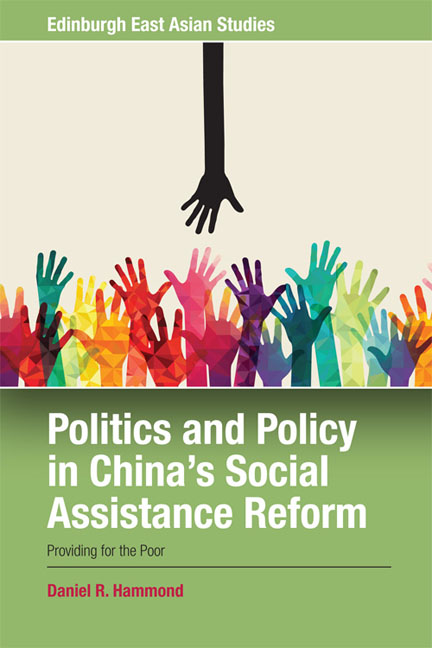Book contents
- Frontmatter
- Contents
- Acknowledgements
- Note on Chinese and Translations
- Glossary of Terms and Abbreviations
- Introduction
- 1 Historical Background to Dibao and the Question of Poverty in China
- 2 Urban Dibao: Emergence and Transition to National Policy, 1992–1999
- 3 Urban Dibao: The Resolution of Unwanted and Unintended Outcomes, 1999–2003
- 4 Rural Dibao: The Countryside and Fragmentation
- 5 Institutionalisation? Achieving Policy in a Fragmented State
- Conclusion
- Appendix: Interview List
- Bibliography
- Index
4 - Rural Dibao: The Countryside and Fragmentation
Published online by Cambridge University Press: 18 December 2019
- Frontmatter
- Contents
- Acknowledgements
- Note on Chinese and Translations
- Glossary of Terms and Abbreviations
- Introduction
- 1 Historical Background to Dibao and the Question of Poverty in China
- 2 Urban Dibao: Emergence and Transition to National Policy, 1992–1999
- 3 Urban Dibao: The Resolution of Unwanted and Unintended Outcomes, 1999–2003
- 4 Rural Dibao: The Countryside and Fragmentation
- 5 Institutionalisation? Achieving Policy in a Fragmented State
- Conclusion
- Appendix: Interview List
- Bibliography
- Index
Summary
Introduction
The previous two chapters focused on explaining the development of the urban dibao programme between 1992 and 2003. It was argued that a combination of the opportunities and limits of China's fragmented authoritarian system and the actions of particular actors had a profound impact on the form and function of the urban dibao system. While developments did not cease to occur in urban dibao – notably the introduction of a more comprehensive (quanmian) system which provided dibao recipients with relief for medical, housing and education costs – the major development during the period after 2003 was the introduction of the rural dibao system as a nationwide policy. This marked a significant change in the focus of social assistance in China which had previously been centred on urban areas and the problem of the new urban poverty, and saw the spread of ideas and practice from the cities into the countryside. Notably the promotion, spread and implementation of the rural dibao system also saw the emergence of similar practices and challenges that had characterised the urban programme. Not everything was the same, however, and the rural dibao system which was eventually implemented also shows slight differences which suggest that lessons may have been learned from the previous experiences implementing the MLG in China's cities.
This chapter will focus on explaining why the rural dibao system was implemented at the time, and in the way, it was. While interviews with Civil Affairs officials suggested that the MCA had learned from the experience of the urban dibao system this is not entirely borne out by a critical analysis of the documents and events leading up to implementation of the rural system and its aftermath. For example, implementation ran along similar lines, with a spread of implementation by local government which was encouraged by the MCA, but not wholeheartedly supported until a higher authority became involved and drove national implementation. Similarly, while some concessions based on the problems of the urban programme were worked into the design of rural dibao, such as guaranteed funding, other problematic areas were left alone, such as calculating the minimum income line for the MLG (the dibao xian).
- Type
- Chapter
- Information
- Politics and Policy in China's Social Assistance ReformProviding for the Poor?, pp. 89 - 105Publisher: Edinburgh University PressPrint publication year: 2018



